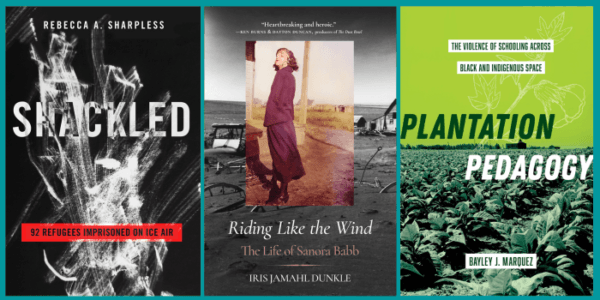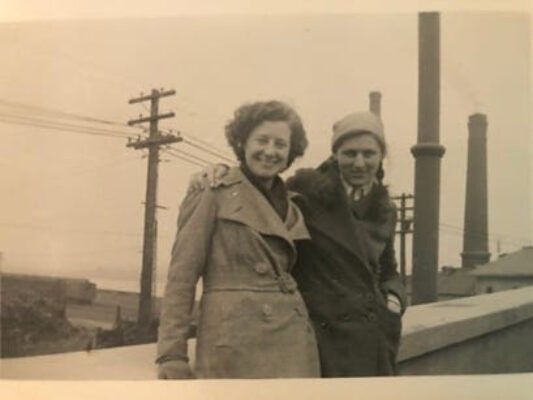“By digging deeper, Dunkle uncovers a remarkable rebel — a woman who challenged social and political norms to defend her writing. She illuminates yet another woman forgotten in the annals of literary history. This biography not only revives a vital voice but reminds us of the many stories still buried in the past, ones that deserve to be dug up and told.”
— San Francisco Chronicle
"In contrast to the door-stopping volumes many contemporary biographers favor, Dunkle’s judicious account of Babb’s eventful life focuses on key experiences and relationships in a brisk text with plenty of meat and no fat. Babb comes across as a fiercely independent free spirit, loyal to those she loved. Riding Like the Wind is a welcome addition to the growing shelf of books devoted to enriching the literary canon with more voices and different points of view.”
— The Washington Post
“Who it’s for: Steinbeck fans and haters alike; readers of Kristin Hannah’s The Four Winds and the New York Times Overlooked column; anyone interested in learning more about the Dust Bowl migrants who fled to California hoping for a better life.”
— The Millions
“An exhaustively researched biography.”
— New York Times
"Iris Jamahl Dunkle’s excellent new biography of Babb tells the story of the largely forgotten writer, and Steinbeck has nothing to do with many of the most gripping chapters, which show how Babb’s destitute heartland childhood shaped her keen empathy."
— ARTS
"Writing in fits and starts, being both ahead of her time and told she was 'too late,' Babb perhaps worked against the wind more than she was able to 'ride' it. Yet the recovery of her extraordinary life and career, though long overdue, may at last allow us to say: Babb’s time is now."
— Los Angeles Review of Books
"Iris Jamahl Dunkle’s compassionate and respectful biography, Riding Like the Wind, . . . is filled with tales of a life that was lived to almost tall-tale proportions."
— The New Republic
"This biography revisits the remarkable life of an author whose account of the Great Depression might have been seminal — if John Steinbeck hadn’t barely beaten her to it. But that hardly scratches the surface of a colorful history that also included friendships and affairs with literary luminaries."
— The Washington Post, 50 notable works of nonfiction from 2024
“A well-researched saga of a woman with deep commitments and unmistakable talent.”
— Nob Hill Gazette
“Iris Jamahl Dunkle’s biography is not merely a kind of restitution but a thrilling recovery of Babb and the world she portrayed so convincingly in her novels, stories, and poetry.”
— The New York Sun
“This is a fascinating study of the life of a colorful, unconventional American writer. Sanora Babb should be more widely appreciated, indeed, and Iris Jamahl Dunkle’s Riding Like the Wind may spur that appreciation.”
— North of Oxford
“This book has really stuck with me. The imagery that Iris Jamahl Dunkle colors the book with is outstanding, and Sanora Babb’s life was so fascinating. This one had me reading like the wind, if you’ll pardon a pun I’m sure 10,000 other reviewers made.”
— Unruly Figures
“Riding Like the Wind: The Life of Sanora Babb is the accomplishment of a fluent and vivid author who weaves a compelling tapestry of family history, the story of a complicated marriage, the repeated frustration of artistic aspirations, and a multi-decade devotion to the Communist movement. Marked by an adept command of language and a desire to probe intimate biographical matters with depth and sensitivity, Dunkle’s engaging account blends archival and literary material in a well-spun narrative tuned to a general audience.”
“Marked by an adept command of language and a desire to probe intimate biographical matters with depth and sensitivity, Dunkle’s engaging account blends archival and literary material in a well-spun narrative tuned to a general audience.”
— Against the Current
"No novelist captured the relentless devastation of the Dust Bowl of the 1930s, or the cruel treatment of the desperate 'Okies' forced to leave their homes on the Plains for California, better than Sanora Babb. In this biography, Iris Jamahl Dunkle explains why. Hardship, hunger and struggle, discrimination and stubborn prejudice, big dreams thwarted by fate and bad luck––these were also recurring elements of Babb's own remarkable personal story. But she met it all with an indomitable will, a vivaciously free spirit, and an unbending devotion to her artistic vision. Riding Like the Wind is a both heartbreaking and heroic tale that brings to vivid life an important American writer who never received the critical acclaim and commercial success she deserved."—Ken Burns and Dayton Duncan, producers of The Dust Bowl
"In my years of researching the lost historical stories of resilient women, few have resonated with me as much as Sanora Babb. A journalist and writer, she was a true trailblazer and a woman who deserves to be remembered for her contributions to both literature and history. This recognition and remembrance of her work is long overdue. I am thrilled that Dunkle has chosen to shine a light on the heartbreaking story of Babb's life and her remarkable novel about the Dust Bowl and the migration of workers to California during the Great Depression. I hope this book encourages readers to also read Whose Names Are Unknown, Babb's account of the period."—Kristin Hannah, author of The Four Winds and The Women
"Dunkle is doing fascinating work as a biographer and cultural historian and makes it succeed because she is a brilliant and vivid storyteller."—Robert Hass, Poet Laureate of the United States, 1995–1997
"This amazing book has changed forever my sense of what it really means to be an American. Dunkle joins today's ranks of women biographers who blow open a closed canon of novels and novelists with her keenly researched and powerfully written saga of the life and times of Sanora Babb. Babb should be read alongside Steinbeck by every high school kid—and Dunkle shows us why."—Alicia Ostriker, New York State Poet, 2018–2021
"Dunkle, through her extensive research and passion for her subject, brings Sanora Babb, a vibrant woman ahead of her times, to life. And it's about time! Dunkle captures the spirit, not just the facts, of Babb's life. By meticulously reading her letters and other unpublished material, Dunkle gets the reader inside Babb's head and motivations, revealing an even more adventurous and complex life than previously imagined. Thanks to plentiful excerpts from Babb's work, the reader experiences and understands her compassion for the outsider and her intimate connection to nature as told through her lyrical writing style. This will be a movie—no doubt."—Joanne Dearcopp, literary executor, agent, and friend of Sanora Babb


